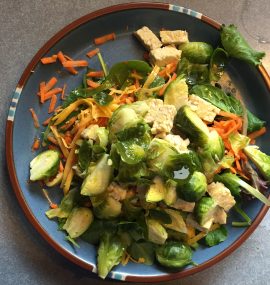Maybe it doesn’t matter that much
What about eating better?
Chris Gardner’s article reporting the results of the DIETFIT randomized, clinical trial made a big splash in the news media in 2018. The trial tested whether a healthy low-fat or a healthy low-carb diet would promote greater weight loss. And the answer: A tie. Low-fat and a low-carbohydrate diets led to nearly identical weight loss (5.2 and 6.0 kg, respectively) over one year. But the big lesson didn’t get the attention it deserved: Forget about low-fat or low-carb and simply eat better. Here’s the rest of the story.
The big lesson of the study arises from four of its key features. 1) Participants were not instructed to limit calories, but were asked to eat in a manner that they could maintain over the long term. 2) Participants were asked to maintain their current level of physical activity. Thus, it was not a factor in the study. 3) Participants attended educational sessions designed to foster emotional awareness around eating and self-regulatory behavior change in the realms of goal setting, self-confidence, supportive environments, and relapse prevention. 4) Participants received detailed guidance to help them eat better. The guidance counseled participants to:
- Focus on whole, real foods prepared mostly at home.
- Eat lots of vegetables, lean grass-fed and pasture-raised animal foods, and sustainably-harvested fish.
- Eliminate or minimize processed food products that contained added sugars, refined white flour, or trans-fats.
- Eat fresh, seasonal foods when possible.
- When eating out, request menu modifications in keeping with your diet assignment. For example, request salad dressing in a small cup instead of on the salad (for the healthy low-fat group), or request a side of greens instead of mashed potatoes (for the healthy low-carb group).
- For participants in the healthy low-fat group, choose whole-grain foods including steel cut oats, farro, barley, quinoa, brown rice, and wild rice, but not whole wheat or white flour products. Choose a wide range of legumes and beans, fresh fruit, low-fat dairy products, and lean meats.
- For participants in the healthy low-carb group, choose high quality oils and fats found in avocados, hard cheeses, nut butters, nuts, and seeds.
And what happened to these participants who ate better, regardless of their assigned diet? They stuck with the program. Attrition is often high in diet studies but not this one. Maybe healthy food is actually satisfying! Though not instructed to do so, participants in the low-fat and low-carb groups spontaneously ate 20 and 24 percent fewer calories , respectively. And the participants lost weight over a one-year period.
Instead of going on a diet, how about eating high-quality food, like a dinner salad? Your health will probably improve and you may end of weighing less without intending to do so. But even if you don’t lose any weight, you’ll feel better and be healthier.








